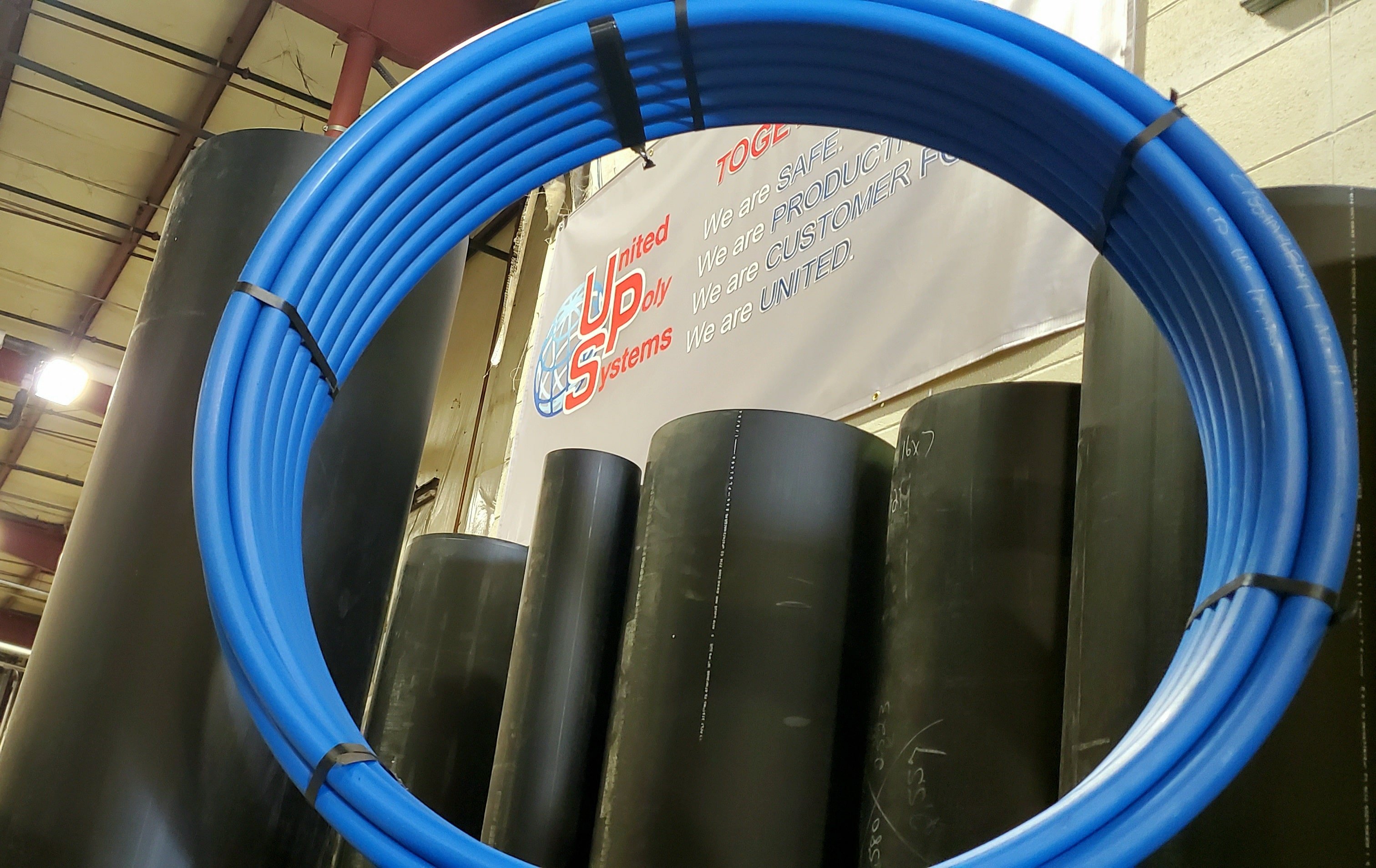Comprehending the Secret Conveniences of HDPE Pipeline for Water and Wastewater Monitoring
Making use of HDPE pipe in water and wastewater management presents various advantages that merit consideration. Its extraordinary durability and long lifespan make it a preferred choice for numerous tasks. In addition, the product's resistance to deterioration and chemical damage improves its dependability in various environments. However, the advantages extend past simply longevity and resistance. Discovering its cost-effectiveness and environmental effect exposes also extra compelling factors for its prevalent adoption in contemporary framework
Exceptional Toughness and Durability

HDPE pipeline attracts attention for its phenomenal durability and longevity, making it a preferred option in water management systems. Built from high-density polyethylene, these pipelines can hold up against considerable pressure and anxiety, guaranteeing trusted performance with time. Their durable nature permits them to withstand extreme environmental conditions, including temperature changes and soil movements, which can create various other materials to fail.
The lifespan of HDPE pipes frequently surpasses half a century, supplying an economical service for communities and markets alike. Additionally, the product's light-weight properties simplify installment, minimizing labor expenses and timeframes. This sturdiness minimizes the need for regular repair services or replacements, better boosting its economic appeal.
In water management applications, the reliability of HDPE pipelines suggests less disruptions and improved solution connection, making them integral to sustainable infrastructure development. The combination of sturdiness and long life strengthens HDPE's duty as a keystone in efficient water monitoring remedies.

Resistance to Corrosion and Chemical Damages
While lots of materials catch rust and chemical damage with time, HDPE pipes display amazing resistance, making them perfect for numerous water monitoring applications. This resilience originates from the molecular framework of high-density polyethylene, which is naturally non-reactive and does not corrode like metals or weaken from exposure to extreme chemicals. Consequently, HDPE is extremely reliable in atmospheres with hostile compounds, such as wastewater systems that might contain acids, bases, and organic solvents.
Furthermore, HDPE pipelines can withstand environmental elements such as dirt level of acidity and saline problems, further enhancing their suitability for diverse applications (hdpe pipe fittings Midland TX). Their capability to preserve structural integrity in time minimizes the danger of leaks and failures, which is important in guaranteeing the security and dependability of water circulation and wastewater administration systems. The resistance to deterioration and chemical damages noticeably adds to the general efficiency and long life of HDPE piping solutions.
Cost-Effectiveness and Economic Advantages
When considering the economic ramifications of water administration systems, the cost-effectiveness of HDPE pipes comes to be obvious. These pipes supply reduced installation and upkeep expenses compared to traditional products like metal or concrete. Their light-weight nature streamlines transportation and installation, causing lowered labor costs. Additionally, HDPE pipelines exhibit a lengthy life expectancy, commonly surpassing half a century, which equates to fewer replacements and lasting financial savings.
In addition, the resistance of HDPE to deterioration and chemical damages lessens the requirement for pricey fixings and substitutes. The pipelines additionally sustain reliable water circulation, minimizing power expenses related to pumping systems. By minimizing leakages and water loss, HDPE pipes add to substantial financial benefits for towns and industries alike. On published here the whole, the preliminary investment in HDPE piping can produce significant monetary returns over the lifespan of the water monitoring system, making it a sensible option for lasting facilities advancement.
Ecological Sustainability and Decreased Effect

Versatility and Flexibility in Setup
Since of their one-of-a-kind homes, HDPE pipes provide exceptional convenience and versatility in setup, making them appropriate for a large range of applications. Their lightweight nature enables much easier handling and transport, lowering labor prices and installment time. HDPE pipes can be curved and shaped to fit different terrains and task demands, which is especially beneficial in testing environments.
In addition, their resistance to check my site corrosion and chemical damages enables installment in diverse setups without the need for specialized safety coverings. The capacity to fuse joints creates a continual, leak-free system, improving the total stability and integrity of the installation. HDPE's adaptability also fits ground movement, minimizing the danger of damages plumbing camera in areas vulnerable to shifting soil. Generally, these characteristics make HDPE pipes not only functional yet also a favored option for water and wastewater monitoring systems.
Frequently Asked Questions
Exactly How Does HDPE Pipe Contrast to PVC in Water Administration Applications?
HDPE pipeline supplies superior flexibility, resistance to rust, and longevity compared to PVC. Its lighter weight helps with less complicated installation, while its long life-span lowers replacement costs, making HDPE a favored option in water monitoring applications.
What Is the Lifespan of HDPE Water Lines Under Common Problems?
Under common conditions, HDPE pipelines can have a lifespan ranging from 50 to 100 years. Their durability and resistance to deterioration add to their lasting efficiency in different applications, making them a dependable choice for infrastructure.
Are HDPE Pipes Recyclable After Their Solution Life?
Yes, HDPE pipelines are recyclable after their service life. Texas hdpe pipe manufacturer. They can be refined and repurposed right into new items, substantially minimizing environmental influence and advertising sustainability within the industry, making them a green option for piping services
What Is the Installation Refine for HDPE Pipeline?
The installation procedure for HDPE pipes involves website prep work, trenching, pipe blend or mechanical signing up with, backfilling, and pressure screening. Correct methods guarantee a sturdy and effective system for transferring water and wastewater efficiently.
Can HDPE Pipes Be Made Use Of for Both Safe And Clean and Non-Potable Water Solutions?
Yes, HDPE pipes can be made use of for both safe and clean and non-potable water systems. Their flexibility, resilience, and resistance to rust make them suitable for numerous applications, making sure safe and reliable transport of water in different contexts.